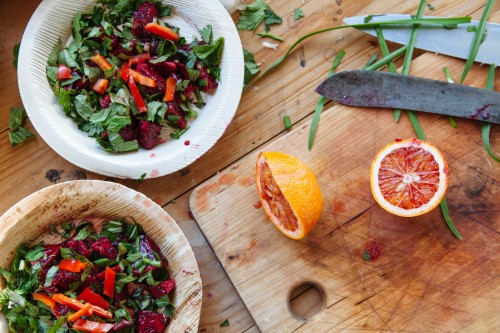I’ve always tended to be a champion and supporter of the underdog, if only for the sheer satisfaction of going against the status quo.
I suppose that’s one of the main reasons that I began questioning the motives of those around me in my early twenties. Why were so many of my coworkers ill and requiring surgeries and pills at such a young age?
It didn’t take long to educate myself on the importance of nutrition and diet. And the true underdogs in the American diet are without a doubt fresh fruits and vegetables; more specifically, the taste of bitter in fresh foods like greens, broccoli, and flavorful herbs. So, naturally, I’m a big fan!

Virtually any salad green has some amount of bitter taste, so eat them early and often.
There are very few items in the American daily diet that are bitter, and even then, they typically have to be highly sweetened to be enjoyed at all (think black coffee and raw, dark chocolate). In fact, beer is perhaps the most frequently enjoyed true bitter in our culture, and it’s definitely an acquired taste. Is it any wonder that watered-down Coors Lite and caramel-sweet Starbucks lattés are so popular?
Today, bitters are primarily used as a cocktail flavoring that softens a strong drink, making it more interesting to the palate with even the smallest addition. Bitters are recognized as one of the four essential ingredients in a true cocktail (spirits, water (ice), and sugar being the other three) and have definitely surged in popularity in the last decade.

A cocktail contains spirits, water (usually in the form of melted ice), sugar, and bitters.
But don’t overlook the freshest and best source of the bitter taste: the foods you eat. In his piece “Blessed Bitters,” herbalist Jim MacDonald identifies the “bitter deficiency syndrome” that’s wreaking havoc on American health. Simply put, cocktails, beer, tinctures, and medicines are not substitutes for the fresh plants that should supply you with the essential bitter taste. Traditional uses abound for even the most modern bitters, but don’t use them as a replacement for a traditional (read: healthy and fresh) diet. Bartanica makes bitters that complement a healthy lifestyle as well as add interest to adult beverages.
Need more food for thought? The ancient life science of Ayurveda recommends eating bitter, astringent and pungent foods last at a meal to help ease the sweet, sour and saltier foods through the digestive tract. Embrace the bitter taste; it will change your life!